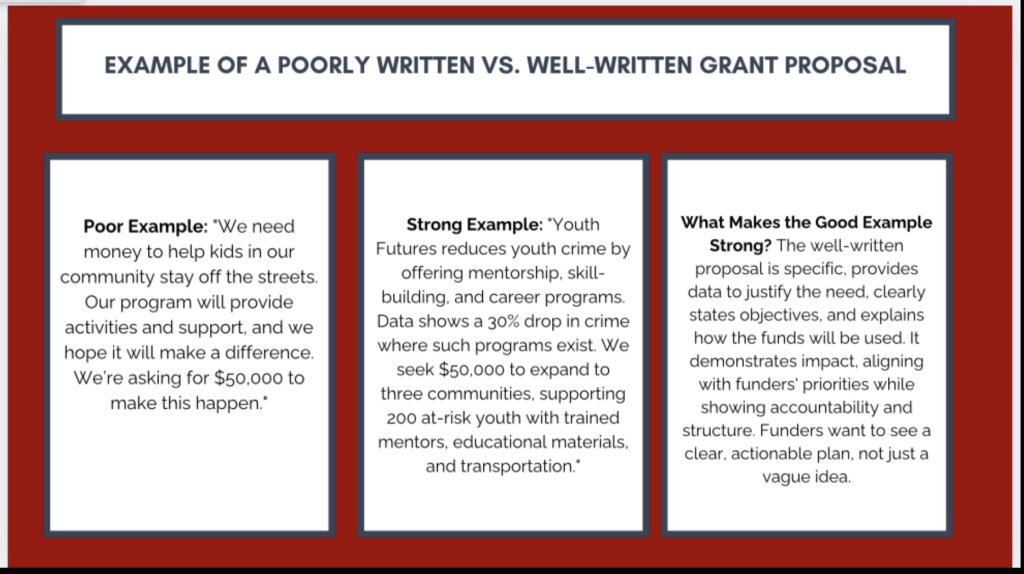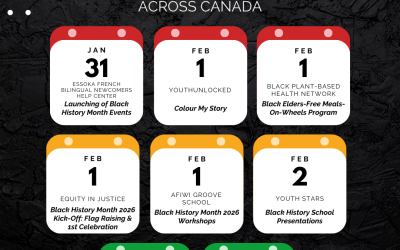A grant is a financial award provided by a government agency, foundation, corporation, or other organization to support specific projects or initiatives that align with their objectives. Unlike loans, grants do not require repayment, making them highly sought after by nonprofits, researchers, and community organizations.
For Black Canadians, accessing grant funding has historically been challenging. A 2021 report titled “Unfunded: Black Communities Overlooked by Canadian Philanthropy” revealed that Black-led and Black-serving organizations have been underfunded compared to others.
Grants are the golden tickets of the nonprofit world as they can be a game changer for organizations. They can fund projects, fuel innovation, and make ambitious ideas a reality. But let’s be real: grant writing isn’t for the faint of heart. It’s a competitive, meticulous, and sometimes frustrating process. The Federation of Black Canadians (FBC) is committed to bridging the gap between what you know (or don’t know) about grant writing and what you need to succeed. Whether you’re applying for your first grant or your fiftieth, understanding the process is your best chance at securing that much-needed funding.
It is not secret that writing a compelling grant proposal requires a strategic approach, strong research, and resilience. Before diving into the writing process, here are some crucial insights that can increase your chances of success.
7 Tips You Need to Know Before Starting to Write Grants
1. Getting Grants Regularly Requires a System
Winning grants isn’t about luck; it’s about having a clear and organized process. Successful organizations track deadlines, keep records of past applications, and use templates to save time. Having a database of funder preferences and past proposals can help avoid repeated mistakes and improve efficiency. A strong system allows teams to work faster, stay consistent, and submit stronger applications.
2. Grants Shouldn’t Be Your Only Source of Money
Grants can provide crucial funding, but relying on them alone is risky. Funding cycles change, and grants are not always guaranteed. Organizations that also raise money through donations, sponsorships, events, and product sales create financial stability. The best approach is to use grants as one part of a bigger funding plan, ensuring long-term sustainability even when grant funding slows down.
3. Every Grant is Different
No two grants are the same, and each funder has different goals, priorities, and requirements. Some funders focus on measurable impact and data, while others prioritize storytelling and community engagement. Tailoring applications to each grant opportunity increases your chances of success. Always read the guidelines carefully, follow instructions, and avoid submitting the same generic proposal to multiple funders.
4. Know What Funders Want – Do Your Research
One of the biggest mistakes grant writers make is failing to align their proposal with the funder’s priorities. Every grant provider has specific goals, whether it’s advancing scientific research, supporting community initiatives, or fostering innovation. Before you start writing, carefully review the funding agency’s guidelines, past grants awarded, and evaluation criteria. Understanding what the funder values will help you tailor your application effectively (Wiseman et al., 2013).
5. Be Okay with Hearing “No” – Rejection Is Part of the Process
Rejection is an inevitable part of grant writing. Even the most seasoned grant writers face denials. Rather than viewing rejection as a failure, use it as a learning opportunity. Many funders provide feedback on unsuccessful applications, which can help refine future proposals. At FBC, we’ve had multiple grant applications that have been rejected in their first application, to get them in preceding years. Applying for multiple grants increases your chances of securing funding, so persistence is key. Sometimes all it takes is that one big grant, to launch your program or a few smaller ones.
6. Don’t Wait for the Perfect Grant – Build Strong Programs First
Instead of waiting for the “perfect” grant opportunity to appear, focus on developing a project first. A well-structured initiative with clear objectives, measurable outcomes, and a strong theoretical foundation is more likely to attract funding. Having a detailed plan in place also makes it easier to adapt your proposal to different funding opportunities rather than starting from scratch each time. At FBC our programs have had many iterations, drawing from different grants that require us to add parts or have very similar objectives, this helps us keep our core program the same while meeting different funder requirements.
Example of a well written proposal Vs. a poorly written proposal:

7. Plan Ahead and Stay Organized
Grant applications often have strict deadlines and detailed requirements. Procrastination can lead to rushed proposals that lack depth and coherence. Develop a timeline for writing, reviewing, and submitting your application well in advance. Additionally, assembling a team;including mentors or colleagues with grant writing experience; can provide valuable insights and increase your chances of success.
Grant Writing: Balancing Opportunity and Challenge
Securing grants is both an art and a science, offering valuable funding while presenting unique challenges. The process requires a deep understanding of funders’ expectations, strong writing skills, and resilience in the face of rejection. Grants often come with strict spending rules, detailed reporting requirements, and long wait times for approval. Some require significant upfront work before any funds are received, which can be particularly challenging for smaller organizations. Successfully managing these hurdles demands patience, organization, and financial planning. Diversifying income sources can help bridge funding gaps, ensuring program continuity while waiting for grant disbursements. By conducting thorough research, refining your writing style, and maintaining persistence, you can navigate these challenges and increase your chances of securing the funding needed to bring your vision to life.
Black Builders Network
This was brought to you by our Black Builders Network. The Black Builders Network is a Black Business and Nonprofit Resource Hub, your go-to destination for accessing a wide range of resources designed to support and empower black entrepreneurs, non-profits, and businesses. For more insights into grant writing and to stay updated on funding opportunities, join our network for free!
Bibliography
Wiseman, J. T., Alavi, K., & Milner, R. J. (2013). Grant Writing 101. Clinics in Colon and Rectal Surgery, 26(4), 228–231. https://doi.org/10.1055/s-0033-1356722







